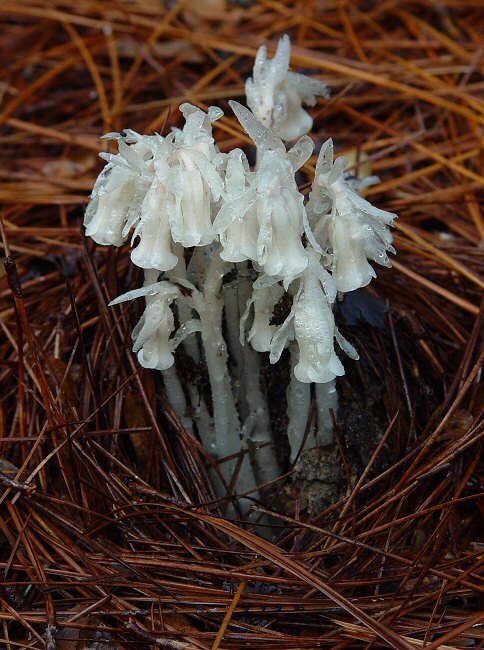Monotropa uniflora L.
Indian Pipe

Native
CC = 7
CW = 3
MOC = 48
© DETenaglia
Monotropa uniflora L.Indian Pipe | |
 |
Native CC = 7 CW = 3 MOC = 48 |
© DETenaglia |
|
Family - Ericaceae Habit - Perennial forb, mycotrophic, achlorophyllous, white when fresh, drying black. Stems - Ascending to erect, to 30 cm, usually in small clusters, unbranched, white or occasionally tinged with red, glabrous. Leaves - Alternate, simple, sessile, scalelike. Blades 5-14 mm long, 3-6 mm wide, glabrous, the margins entire or slightly irregular. Inflorescence - Solitary terminal flower subtended by a single leaflike bract. Flowers - Sepals apparently absent in Missouri material (4 or 5 sepals, 7-10 mm long elsewhere). Corollas of 3-6 free petals, these 13-18 mm long, 5-9 mm wide, broadly oblong, usually minutely hairy on the inner surface, white. Stamens 6-10 in 2 whorls, attached between the pairs of lobes of a nectary disk, the anthers elliptic, dehiscing by 2 slits across the tip. Ovary superior with 5 locules. Stigma obconic, with a relatively deep, irregular depression at the tip lacking a fringe of hairs.
Fruits - Capsules, the body 10-12 mm long, 8-10 mm wide, capped by the persistent style, brown at maturity, the capsule wall segments thickened, persisting after dehiscence, often into the following year. Flowering - August - October. Habitat - Forests, often emerging from abundant leaf litter. Origin - Native to U.S. Lookalikes - None. Other info. - This unique plant can be found throughout much of Missouri, most commonly in the southern half, rare or absent in some northern regions. The plant also occurs across the eastern half of the continental U.S., the Pacific Northwest, and into Canada and Mexico and beyond. It is easily recognized by its white color, due to lack of chlorophyll, and general appearance. The plant seems to pop up sporadically and unpredictably, and is relatively difficult to locate intentionally. Finding more than a dozen or two stems in a few small clumps is very rare, at least in Missouri. Photographs taken in Alley Spring Park, MO., 10-2-03, and in Conecuh National Forest, AL., 10-24-04 (DETenaglia); also at LaBarque Creek Conservation Area, Jefferson County, MO, 9-19-2008, and Don Robinson State Park, Jefferson County, MO, 9-24-2019 (SRTurner). |